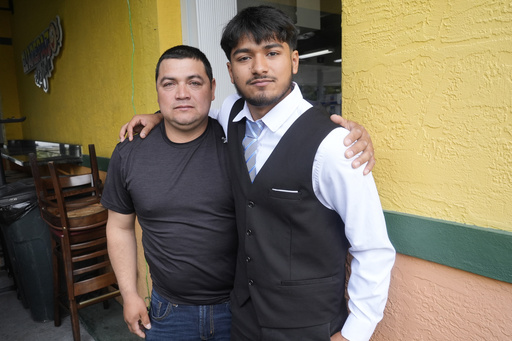In a rural high school in the South, a 16-year-old named Billy keeps a painful part of his past hidden from his friends. Six years ago, he was among thousands of children separated from their parents due to the zero-tolerance immigration strategy implemented by former President Donald Trump at the U.S.-Mexico border. While he actively plays soccer and football at school, Billy refrains from discussing his experiences, including the heart-wrenching moment his father received the devastating news that Billy was being put up for adoption and might never see him again.
As another election looms, threatening to bring Trump back into office, Billy feels compelled to share his story. The trauma of separation still weighs heavily on many families, with some remaining apart and others living under temporary immigration statuses, facing fears of mass deportation should Trump carry out his threats. “It was a very painful thing that happened to us,” Billy reflects, wishing to keep his full name and location private to protect his family’s asylum efforts.
Trump continues to emphasize immigration as a critical component of his campaign, attacking the Biden administration and Vice President Kamala Harris for perceived failures in securing the southern border. Although Harris hasn’t emphasized immigration as a focal point of her campaign, she has criticized Trump’s zero-tolerance approach, one of his most controversial immigration measures.
The initiative undertaken during Trump’s presidency sought to criminally prosecute all adults attempting to cross the border illegally, resulting in the separation of parents from their children, who were subsequently placed in shelters across the country. While the Trump campaign has not definitively outlined whether they would reignite family separation practices if elected, they have defended it, with Trump previously claiming it helped deter migration.
“President Trump will restore his effective immigration policies, implementing stringent measures against criminal smugglers and executing the largest deportation operations for illegal immigrants, drug traffickers, and human traffickers in American history,” declared Karoline Leavitt, spokesperson for the Trump campaign. In response, the Harris campaign recently held an event spotlighting children separated from their families, drawing attention to the consequences of Trump’s policies.
Billy participated in this event, part of a collective of children who share their experiences through social media and advocacy visits to lawmakers in Washington. He emphasizes that, although he typically refrains from discussing his past, he and others are essential in ensuring their voices are heard to prevent future occurrences of such separations.
Many families, years after being separated, find themselves caught in a complicated legal situation. A settlement reached recently between affected families and the Biden administration allows families two years to apply for asylum through a more lenient process. As the election approaches, advocates report that these families are anxious about a potential Trump presidency and what it would mean for their futures.
“Those we serve are scared and uncertain about the implications of a new Trump administration,” noted Anilú Chadwick Soltes, the pro bono director for the organization Together & Free, which was established in response to the policy. Although a recent 2023 settlement prohibits future administrations from utilizing family separations until at least 2031, advocates are wary of loopholes that could undermine this protection.
Historically, the policy drastically shifted from the norm of keeping families intact during their border crossings. The intent was to deter crossings by prosecuting every individual, resulting in children being treated as unaccompanied minors and placed in shelters while their parents faced prosecution.
Amid mounting public outcry, Trump announced the cessation of the policy on June 20, 2018. Shortly thereafter, a court ordered the reunification of the separated families, although logistical challenges plagued the process, with agencies lacking cohesive systems, leading to disarray and many deportations before reunification could occur.
Following Joe Biden’s inauguration, he initiated a task force aimed at reuniting families, identifying approximately 5,000 children separated, with around 1,400 still unaccounted for. Some remain in the reunification process, while others may have come together in the U.S. without coming forward due to fears of government repercussions. Advocacy groups, including the American Civil Liberties Union (ACLU), continue to play a crucial role in this effort, with estimates suggesting that around 5,500 children have been impacted by these policies.
Individuals like 22-year-old Efrain, who were separated from their parents, bear psychological scars. Efrain grappled with guilt over urging his father to undertake the journey to the U.S. in 2018, only for them to be separated upon arrival. After his father was deported to Guatemala, Efrain was placed in a shelter for several months. Even after their reunion three years later, the emotional toll remains evident, affecting their relationship and Efrain’s mental well-being.
Meanwhile, Billy’s father is still visibly pained by their experiences and fears that society may forget the trauma endured by families like theirs. Billy recognizes the significance of his narrative, affirming, “I know that my story holds a lot of power,” signifying his commitment to advocate for those affected by this traumatic history.



